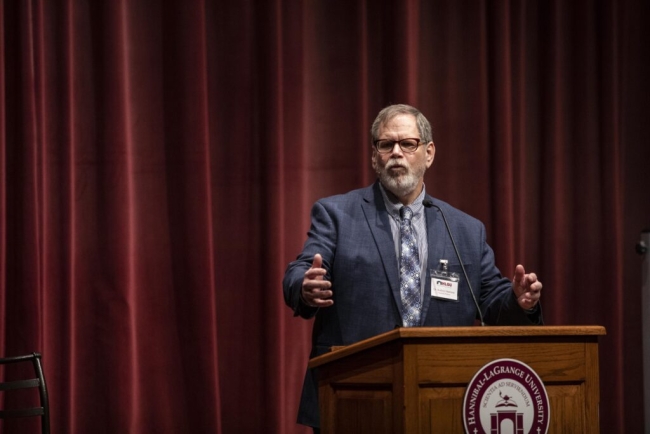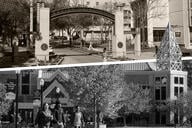You have /5 articles left.
Sign up for a free account or log in.

Rodney Harrison was appointed to help Hannibal-LaGrange chart a path forward. He is unpaid.
Courtesy of Hannibal-LaGrange University
Less than a month ago, Hannibal-LaGrange University was facing a financial crisis that was “too big for humanistic responses,” according to its president, Rodney Harrison. But over the last few weeks, university officials have established a challenging—but possible—path forward.
The small Baptist university in northeastern Missouri has faced declining enrollment for years. For a college that relies almost entirely on tuition to fund its operating expenses, even small changes to student numbers can have devastating effects. This year, the university counted 780 total students, down from 810 last year, Harrison said. Ten years ago, the university enrolled more than 1,000 students, according to the National Center for Education Statistics.
The COVID-19 pandemic brought additional financial stress to the struggling institution. Many higher education leaders expected the pandemic to be a death knell for small colleges with “their fingernails on the edge of the cliff,” said Tim Fuller, the founder of Fuller Higher Ed Solutions, a consulting firm for Christian colleges. But the wave of college closures that experts expected never came to pass, likely because relief funding from the federal government buoyed those institutions in the short term.
Some institutions saw the stimulus funding “as a welcome relief to basically keep the lights on for a period of time, and they didn’t have enough margin to do anything particularly strategic,” Fuller said.
Harrison admits that the relief funding, though much appreciated, may have masked Hannibal-LaGrange’s financial reality. In truth, the university had failed for years to modify its business model to account for the falling enrollment.
“We’ve said we know we could have done better—we’ve not been wise stewards,” Harrison said.
Now Harrison has a plan. He’s implementing strict austerity measures while also embarking on an ambitious fundraising campaign.
Presently the university sits on $690,000 of debt and needs to raise $2.2 million to open debt-free in the fall. University officials have determined they must raise at least $150,000 each week to meet their goal by the time the current fiscal year ends in June. During the first two weeks of the fundraising efforts, they brought in $88,000 and $92,000, respectively, but this week they are on track to exceed their $150,000 benchmark, Harrison said.
“Today I had a phone call from a church. It’s not a big church, but they are giving a very big gift because they said they would never want to see a student not be able to go to HLU,” Harrison said.
Harrison was appointed in early March as a transitional president, tasked with charting a path forward for the university while the Board of Trustees identifies a successor to former president Anthony W. Allen, who retired in January. Harrison is also president of the Baptist Homes & Healthcare Ministries and is effectively “on loan” to the university, he said.
In addition to the fundraising effort, the university has implemented strict austerity measures to curb its expenses through the spring term. All employees were moved to a four-day workweek, resulting in a 20 percent total cut to payroll. The university discontinued its 403(b) retirement contributions for the duration of the austerity period. A few employees took voluntary furloughs, and others took additional pay cuts. Harrison himself is completely unpaid.
Going public with financial troubles is a gamble, Fuller said.
“There’s that delicate balancing act when you say, ‘We need to raise X amount of dollars in order to stay open,’” Fuller said. “On the one hand, alumni and others—in this case, Missouri Baptist Church—may rise to your defense to do something. But at the same time, prospective students may go, ‘Well, why would I go there if it’s a possibility that they might close?’”
Harrison is well aware of that risk. But he believes the university’s situation and recovery could be a selling point.
“One of the reasons to come here is because—if you’re a Christian, faith-based person—you want to be where you’re seeing God’s work. You want to see us living out those values of integrity, those values of forgiveness and transparency,” Harrison said. “That is what’s happening right now.”
Pat Taylor, the former president of Southwest Baptist University in Bolivar, Mo., expects that Hannibal-LaGrange will meet its goals in the short term, but he isn’t as certain that the university will be able to develop a sustainable business model quickly enough.
“You cannot spend more money than you bring in—I’ve always joked that the only entity that can do that consistently over a period of time is the federal government,” Taylor said. “You cannot outstrip your resources, and sometimes that’s a lot easier said than done.”
Fuller hopes that other Christian colleges take steps to refresh their student outreach and drive up their value to students before they find themselves in Hannibal-LaGrange’s position.
“I find sometimes people are too eager to focus on price, and I wish more and more campuses would invest time and energy into figuring out why they’re worth choosing and telling that story with more enthusiasm,” Fuller said. “It’s tough to do that when you get into a situation like what Hannibal-LaGrange is in, but for places that are not at that point yet, my wish would be that they would spend as much or more time on that.”
Despite the current challenges, Harrison and other university officials feel confident that they will be able to keep the university open for years to come.
“We are truly seeing an outpouring of support from our community, and from our constituency and the churches,” Harrison said. “I feel very optimistic that the best days are still ahead for Hannibal-LaGrange.”




